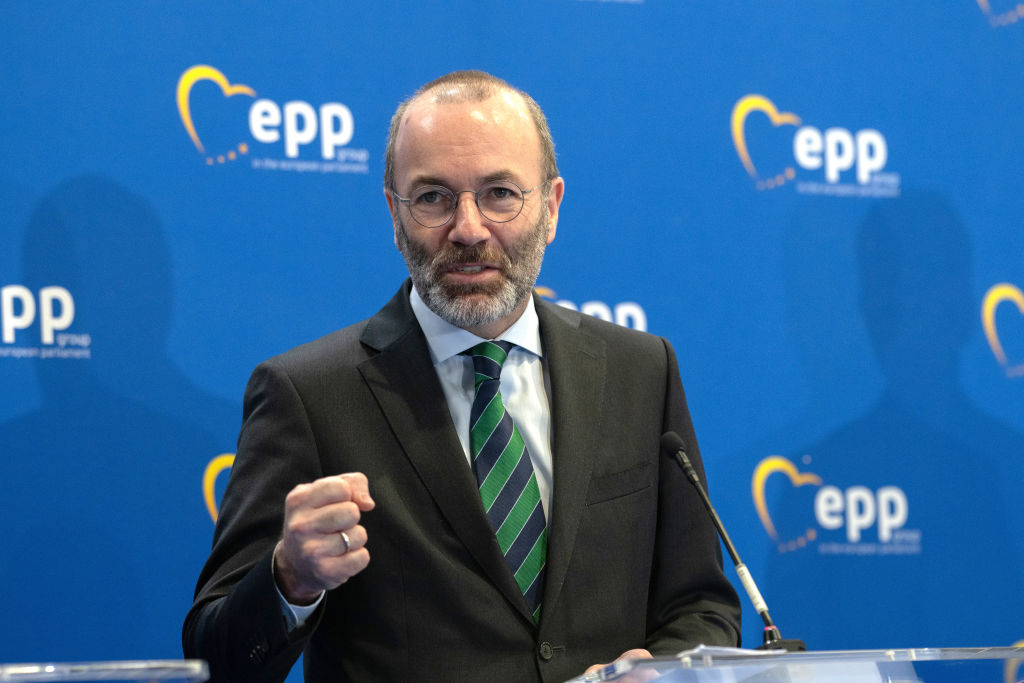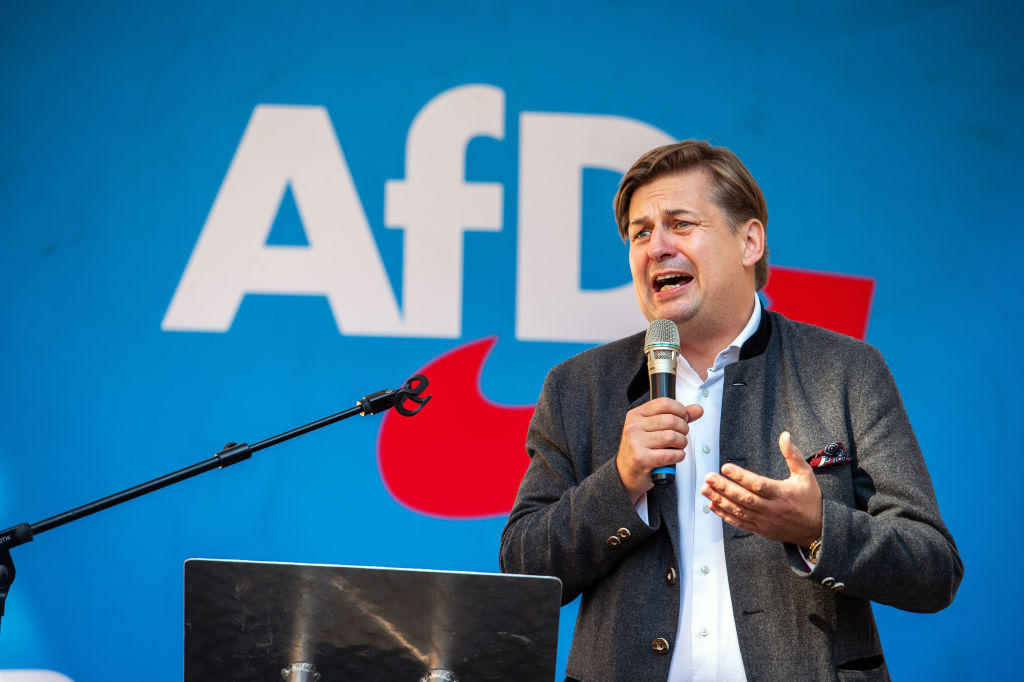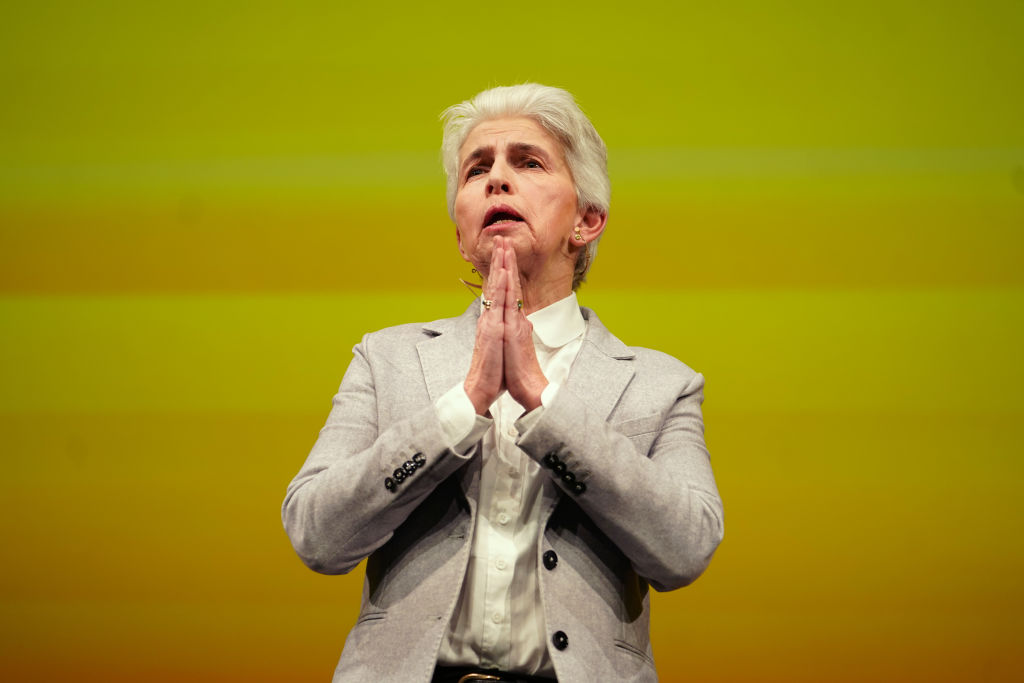Germany’s ruling coalition faces a potential cataclysm in the country’s east as populist parties surge ahead of next month’s regional elections.
Citizens in the states of Thuringia and Saxony vote on September 1, with a further election also set to take place in Brandenburg later in the month. The elections are being held to decide the makeup of each state’s parliament — important bodies due to Germany’s decentralised political system.
In all three states, the parties that make up the ruling “traffic light” federal government — the Social Democratic Party (SPD), the Greens, and the Free Democratic Party (FDP) — are expected to be brutalised.
With each party running in the election required to land 5 per cent or more of the vote to get a single seat, current polling indicates that the Greens are likely to miss out on representation in Thuringia, with Brandenburg and Saxony being too close to call.
Chancellor Olaf Scholz’s SPD is in a better position — polling at 20 per cent in Brandenburg — but nevertheless is at risk of elimination in Saxony and Thuringia.
The FDP — a member of Emmanuel Macron’s Renew Europe group in the European Parliament — is expected to be annihilated, with the party expected to win zero seats. It is polling between 4 and 1 per cent.
Such poor polling leaves the Christian Democratic Union as the last mainstream party standing in the three states. The European People’s Party member is currently polling in second and third place in Thuringia and Brandenburg respectively, while current data indicates that it could narrowly win the regional election in Saxony.
Keeping the AfD out of power via a grand coalition could result in a return to weak, unstable Weimar Republic-style governments, @hoyer_kat, an academic of East German origin, tells @JustinStares.
Watch the full interview at https://t.co/HNVo5yeFPE pic.twitter.com/AHVxQLZ7qW
— Brussels Signal (@brusselssignal) February 14, 2024
The European Parliament elections in Germany spooked many centrist and centre-left pundits in the country, with the populist Alternative for Germany (AfD) overcoming bad polling and frequent scandals in the media to finish with 15.9 per cent of the vote.
While this result put them ahead of all three government parties and cemented their position as Germany’s second most popular political group, such a result is likely to be dwarfed over the weekend.
According to the most recent data, the AfD is the single most popular party in both Brandenburg and Thuringia — 24 per cent and 29.5 per cent respectively.
In Saxony, the party is mostly thought to be the second strongest force, though recent polling indicates that it may have crept ahead of the CDU in recent weeks.
Speaking to Brussels Signal, AfD Bundestag MP Siegbert Droese said that the the party’s success was down to its willingness to listen to voters, a trait that he believes will see his party win first place in both Thuringia and Saxony on Sunday.
“The state elections in Saxony and Thuringia are a decisive test for the political development in Germany. The AfD is expected to win both elections,” the Saxony parliamentarian said.
“The reason for this is the clear and authentic attitude of the AfD regarding the ongoing illegal migration and the associated violent crime, but also the reasonable commitment of the AfD against the economic mis-developments due to climate hysteria as well as the countless social problems in the field of education and social affairs.
“Germany has been faltering from crisis to crisis for many years, but the governing parties have still no solutions to the problems of our time. For this reason, these parties will be penalised in Sunday’s elections,” he added.
An East-West split has been cemented in Germany following the European Parliament elections with former territories of West Germany opting for the centre-right CDU, while East Germans supported the right-wing Alternative for Germany (AfD). https://t.co/yVOXlK5H6V
— Brussels Signal (@brusselssignal) June 10, 2024
AfD is not the only populist party making gains in the three states.
The Sahra Wagenknecht Alliance (BSW) — a populist-left outfit — is also performing strongly. Despite only officially being launched earlier this year, the party is already polling stronger across Germany.
Like the AfD, the party is particularly strong in the German east and is expected to pull in around 13 per cent of the vote in Saxony, 17 per cent in Brandenburg and 18 per cent in Thuringia.
At the centre of the new group is the eponymous Sahra Wagnknecht. Previously the talismanic member of the Socialist The Left party, she opted to abandon the group last year over differences in social policy.
Wagenknecht has now opted to focus on a style of politics that has been termed “left Conservatism”, with the BSW focusing on an expansion of social democracy while maintaining stances on immigration and the family that are more commonly seen on the Right. Some of the BSW’s attitudes echoing those held by the Socialist Unity Party (SED) — the party that previously ruled over Communist East Germany.
Wagenknecht herself has her origins in the SED, joining the then-floundering Communist outfit in 1989, with many of her party members also having previously been members of the ruling Socialist group.
East Germany seems to threaten resurrection. Not as a Communist country or an independent state, but as a genuinely unique sociopolitical entity in Europe, the politics of which are totally unlike anywhere else in the Western world, writes @Peter_Caddle. https://t.co/dNLnpG594t
— Brussels Signal (@brusselssignal) January 25, 2024
Much has been made of the east-west divide when it comes to the rise of both the AfD and the BSW.
While both parties have different relationships with the region’s Communist past — with many BSW members having been involved in the Communist state, whereas many now-AfD members actively fled it — pundits have been quick to attribute both parties’ growth in Saxony, Thuringia and Brandenburg to the legacy of the GDR.
Those making the argument point to political polling. While the mainstream centrist and left-wing parties have seen their polling decline across Germany, each one remains relatively prominent in the country’s west.
One example of this is the result of the borough elections in Hamburg earlier this year, which saw the SPD and the Greens come first and second respectively.
Some point to the more sceptical relationship eastern Germans have with the concept of democracy. Polling in 2023 found that one-third of those living in the former territory of the GDR agreed with the statement that their country “should have a leader who rules Germany with a strong hand for the good of all”.
Another sticking point is Russia. While the ruling parties have taken a firm stance against the Kremlin since its 2022 invasion of Ukraine, with frequent commitments to deliver weapons to Kyiv, both the AfD and BSW have opted for a more neutral approach to the conflict.
While there are internal deviations within each of the populist parties, most representatives have argued that Germany should be pushing for a peaceful resolution to the war as soon as possible via diplomacy with Russia.
The division is made even more clear by the CDU. While the party is a major supporter of Ukraine at the federal level, many of its representatives in the country’s east have been less keen to back Kyiv.
Michael Kretschmer, CDU member and Prime Minister of Saxony, has called for Germany to reduce its aid to Ukraine, arguing that the donations had not yielded any real results.
“[W]e are realising that we are reaching our limits,” he told outlet Die Zeit earlier this month.
Others have pushed back against the idea that there is a causal relationship between these factors and the success of populism in eastern Germany.
Speaking to Brussels Signal, historian Katja Hoyer argued that while things might be moving faster in the east than in the west, the phenomenon of growing populism is present nationwide, as well as in other parts of Europe.
“I don’t think East Germany is the outlier that it seems when compared to West Germany. We see similar patterns of voting in countries like France, Italy or Austria,” she said.
“The AfD is also on the rise in West Germany, currently polling as the second most popular party Germany-wide. East Germany is further down the same line because there is less loyalty to the established parties because people have only had them for 34 years and they were born in and shaped by post-war West Germany.
“Because easterners aren’t wed to parties over generations, they are more politically mobile and react to dissatisfaction more readily,” she added.
The lesson for politicians in Berlin should be the same as everywhere across the west: ask yourself why people vote this way and do something about it.”
An evangelical church in Germany has removed one of its members from all of his leadership roles as a result of his links to the Alternative for Germany (AfD) party. https://t.co/lLDX4NSGVs
— Brussels Signal (@brusselssignal) August 22, 2024





